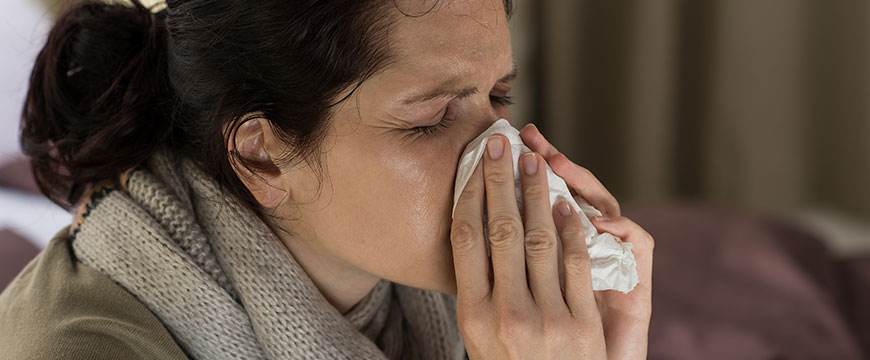
Allergies can be annoying and uncomfortable, whether those pesky ones occur seasonally when flowers bloom or the more regular ones caused by dust mites and pet dander. The good news is that you don’t have to put up with that.
Of course, there are over-the-counter products that you can use to mitigate the same, but have you thought about going the homemade way? You will save some cash and reduce frequent trips to your local allergy clinic.
Here are many ways to make your home a more allergy-friendly place.
Regular cleaning
Keeping your home clean sounds like something that should come naturally, but this is not always the case. If you want to reduce the chances of you or your family suffering from allergies, you may want to do the following:
Dust: Dust particles often contain allergens like pet dander, pollen, and dust mites. As such, use a damp cloth to wipe the surfaces in your home. This will effectively eliminate dust compared to dry dusting.
Vacuum: Dusting alone is not enough. Your floors and upholstery also harbor allergens. This is why using a vacuum cleaner equipped with a HEPA (High-Efficiency Particulate Air) filter is important. HEPA filters are designed to capture tiny particles, including allergens, preventing them from being recirculated into the air.
Air purifiers
Air purifiers do a great job of eliminating indoor allergens. They work by filtering the air and removing microscopic particles that can trigger allergic reactions. Again, when purchasing one, ensure that it has a HEPA filter.
High-efficiency particulate Air (HEPA) filters are known for their exceptional ability to capture small particles, including allergens like pollen, dust mites, and pet dander. When you run an air purifier with a HEPA filter, it continuously circulates and filters the air in a room, trapping allergens in the filter.
Moreover, these appliances often come with a noise control feature that allows them to run quietly in case you are concerned about noise disruptions.
Allergy-friendly bedding
Consider investing in allergen-proof pillows and mattress covers. Why? Because these create a barrier between you and allergens like dust mites. Furthermore, ensure you wash bedding, including sheets and pillowcases, in hot water weekly, and consider using hypoallergenic pillows and duvets.
Humidity control
It is necessary to control the temperatures in your home. Precisely, you want to maintain indoor humidity levels below 50%, as this will inhibit dust mite and mold growth.
A dehumidifier can help achieve this, but you must ensure proper ventilation to prevent moisture buildup.
Pet care
Pets are the most common culprits for allergic reactions. Therefore, if you have pets and are allergic to them, keep them out of your bedroom, groom them regularly, and vacuum your space frequently. You also want to clean pet bedding and toys to reduce allergen exposure regularly.
Remove clutter
This may sound outlandish, but clutter does contribute to the accumulation of allergens in your space. In that regard, you want to minimize clutter in your home as it provides more hiding places for dust and allergens.
The best action would be to eliminate items that collect dust and adopt a minimalistic approach to home decor.
Seal cracks and leaks.
Inspecting your home for cracks, gaps, and leaks is crucial in creating an allergy-friendly environment. This is because such openings can allow outdoor allergens to infiltrate your living spaces, compromising your efforts to maintain clean indoor air.
Here’s why sealing cracks and leaks is necessary and how to effectively do it:
Allergen entry points: Outdoor allergens such as pollen, mold spores, and outdoor air pollutants can easily find their way into your home through small openings. Some common entry points include gaps in your doors and windows, foundation cracks, wall holes, and poorly sealed ducts.
Preventing infiltration: When you seal these entry points, you block allergens from getting into your space, reducing your indoor allergen load and making it easier to keep your space allergen-free.
Depending on the size and type of opening, you want to use the recommended material, such as expanding foam or caulk. You also want to ensure that your windows and doors are tightly sealed when closed.
You also want to check for any gaps where different building materials meet and seal them.
Natural cleaning products
Are you aware that most cleaning products contain harsh chemicals? This is because the chemicals do a good job of removing stains and sometimes even disinfecting. However, the downside to such chemicals is that they could cause allergic reactions.
To counter that, you may use more natural or hypoallergenic cleaning products. The trick is to ensure that they are just as effective.
Other benefits of using natural cleaning products include:
Reduced chemical exposure: As previously mentioned, most cleaning products typically contain chemicals that can trigger allergic reactions or aggravate existing allergies.
With natural cleaning products, you do not run the risk of the same.
Allergen elimination: The formulation of some natural cleaning products targets allergens such as pet dander and dust mites. In that regard, they can help eliminate such allergens from your space more effectively.
Scent options: Fragrances can also cause allergic reactions. Natural cleaning fragrances do not contain artificial fragrances, reducing the chances of that happening.
Allergen-free diet
If you have food allergies, you must be vigilant about reading food labels and avoiding allergenic ingredients. Ideally, you should designate an allergen-free kitchen area to minimize cross-contamination when cooking.
Allergen-free home décor
Choose home decor that is easy to clean and less likely to trap allergens. When it comes to flooring, opt for hardwood or laminate flooring over carpets, and use blinds or shades instead of heavy curtains.
Final Thoughts
In addition to these measures, consulting with an allergist Germantown MD to develop a personalized allergy management plan is essential. They can recommend appropriate medications or immunotherapy if necessary.
By incorporating these strategies into your daily routine, you can create a more allergy-friendly home environment and reduce the impact of allergens on your health and well-being.




